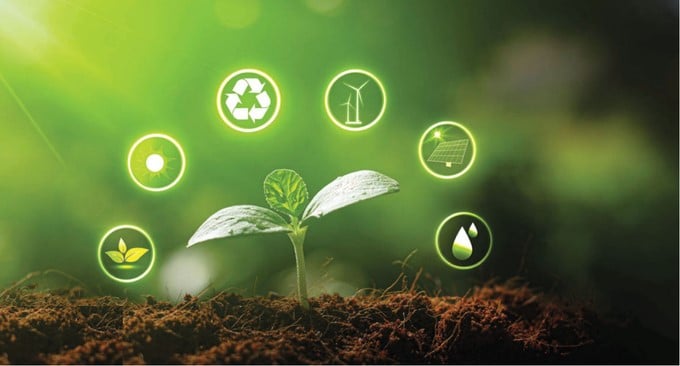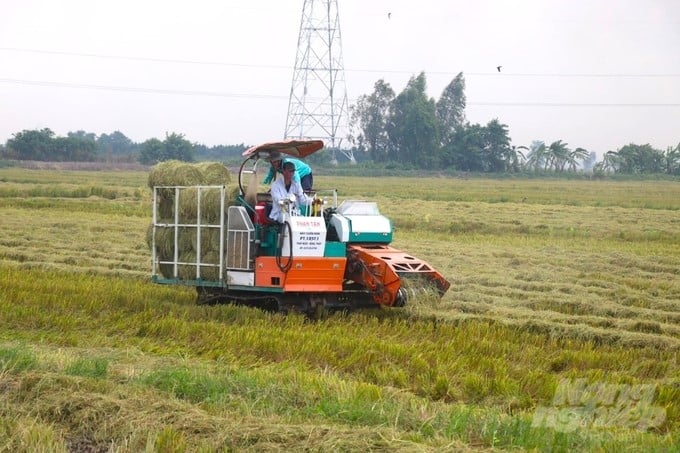May 19, 2025 | 04:40 GMT +7
May 19, 2025 | 04:40 GMT +7
Hotline: 0913.378.918
May 19, 2025 | 04:40 GMT +7
Hotline: 0913.378.918

The Prime Minister requested Ministries, branches, localities, and businesses to proactively meet green policies of the European Union. Photo: EU.
Prime Minister Pham Minh Chinh has just signed Official Telegram No. 17/CD-TTg dated February 20, 2025, on actively and proactively implementing solutions to promote the circular economy, sustainable production and consumption, and sustainable trade to meet green policies of the European Union (EU).
The EU's green agreements are both a challenge and an opportunity for Vietnam to proactively implement green transformation synchronously. Therefore, it is extremely urgent to promote the deployment of appropriate solutions to proactively respond and meet the EU's green policies.
In order to support businesses to implement green transformation and promote exports and sustainable chains, the Prime Minister requested the Minister of Industry and Trade to focus on prioritizing research on regulations and standards related to circular economy, ecological design, toxic chemical management, waste management, and regulations on recycling content for some materials to meet international regulations and standards.
Focus on technical support for green transformation; strengthen scientific research and the application of technology and innovation and promote digital transformation to meet practical requirements and development trends of the digital economy and industrial revolution 4.0. Focus on researching and developing new, recycled, and renewable raw materials, fuels, and materials, and green, eco-friendly chemicals to create sustainable products.
Build and support ecological certification and labeling activities for products meeting market requirements and international regulations. Improve the capacity and guide businesses on developing sustainable development reports, international procedures on declaration, and information on the product's "green, sustainable, organic" factors. Review and research green policies at the European Green Deal to promptly disseminate, guide, and support businesses.
The Prime Minister asked the Minister of Natural Resources and Environment to continue building and completing legal policies on environmental protection and climate change. Organize the implementation of the National Action Plan on the circular economy; promote the application of waste classification solutions at source; strengthen collection, recovery, minimizing, reusing, and recycling. Limit waste generated and minimize adverse environmental impacts.
Strengthen the implementation of policies and regulations on the expanding responsibility of manufacturers and importers, promoting the application of waste classification solutions at source, strengthening collection, recovery, minimizing, reusing, recycling; limiting waste generated; and minimizing adverse environmental impacts.
The Minister of Science and Technology chairs and coordinates with Ministries to review, develop, and complete policies attaching green, circular, and sustainable factors. Focus on building and implementing tasks to promote research, renovation of technologies, and use of new, recycled, renewable raw materials, fuels, and materials.
Ministers of Construction, Transport, Agriculture and Rural Development, Labor, War Invalids and Social Affairs, and other Ministries focus on implementing and performing the tasks assigned in current legal policies on sustainable development, circular economy to protect the environment and respond to climate change, and green growth. In particular, focus on evaluating the EU's green regulations and policies; closely coordinate with the Ministry of Industry and Trade to support businesses to apply sustainable models.

The collection and reuse of straw after harvesting rice is one of the typical efforts of the circular economy in agriculture. Photo: Kim Anh.
The Minister of Finance and Planning and Investment prioritizes the arrangement and mobilization of appropriate resources in implementing programs and tasks related to sustainable development and the circular economy. Research and evaluate the EU's green financial tools to support Vietnamese businesses to implement green transformation and practice production and business.
The Presidents of local People's Committees promote local action plans on sustainable production and consumption, economical and efficient use of energy, and green growth; promote waste classification at source; and minimize, recover, reuse, and recycle waste.
Support businesses to implement green transformation, renovate technological applications, and apply sustainable and circular models. Create conditions for developing models of ecological industrial parks and industrial clusters and promote circular chains to solve urgent issues on environmental pollution; promote efficient and sustainable use of resources and energy; and develop recycled and renewable materials.
Localities coordinate with Ministries, branches, and business associations to implement policies, projects, programs, and plans on circular economy, sustainable production and consumption, economical and efficient energy use, climate change response, and green growth.
Industry associations and general directors of corporations and groups proactively capture information and market demand; focus on developing criteria and content on sustainable development; encourage innovations, internal emulation movements, and sustainable production and business practices. Strengthen sustainable linkages between businesses and parties to promote sustainable and circular chains.
Translated by Thu Huyen

(VAN) The decree on Extended Producer Responsibility (EPR) ensures transparent management and disbursement of support funds, avoiding the creation of a “give-and-take” mechanism.

(VAN) Hue City rigorously enforces regulations regarding marine fishing and resource exploitation, with a particular emphasis on the monitoring of fishing vessels to prevent illegal, unreported, and unregulated (IUU) fishing.

(VAN) Hanoi People's Committee has issued a plan on reducing greenhouse gas emissions in the waste management sector with 2030 vision.

(VAN) Vietnam's draft amendment to Decree No. 156 proposes a mechanism for medicinal herb farming under forest canopies, linking economic development to population retention and the sustainable protection and development of forests.

(VAN) In reality, many craft village models combined with tourism in Son La have proven effective, bringing significant economic benefits to rural communities.

(VAN) The international conference titled Carbon Market: International experiences and recommendations for Vietnam was successfully held recently in Ho Chi Minh City.

(VAN) According to the Project on rearranging provincial and communal administrative units, in 2025, the country will have 34 provinces/cities, 3,321 communes, wards, and special zones, and no district-level organization.